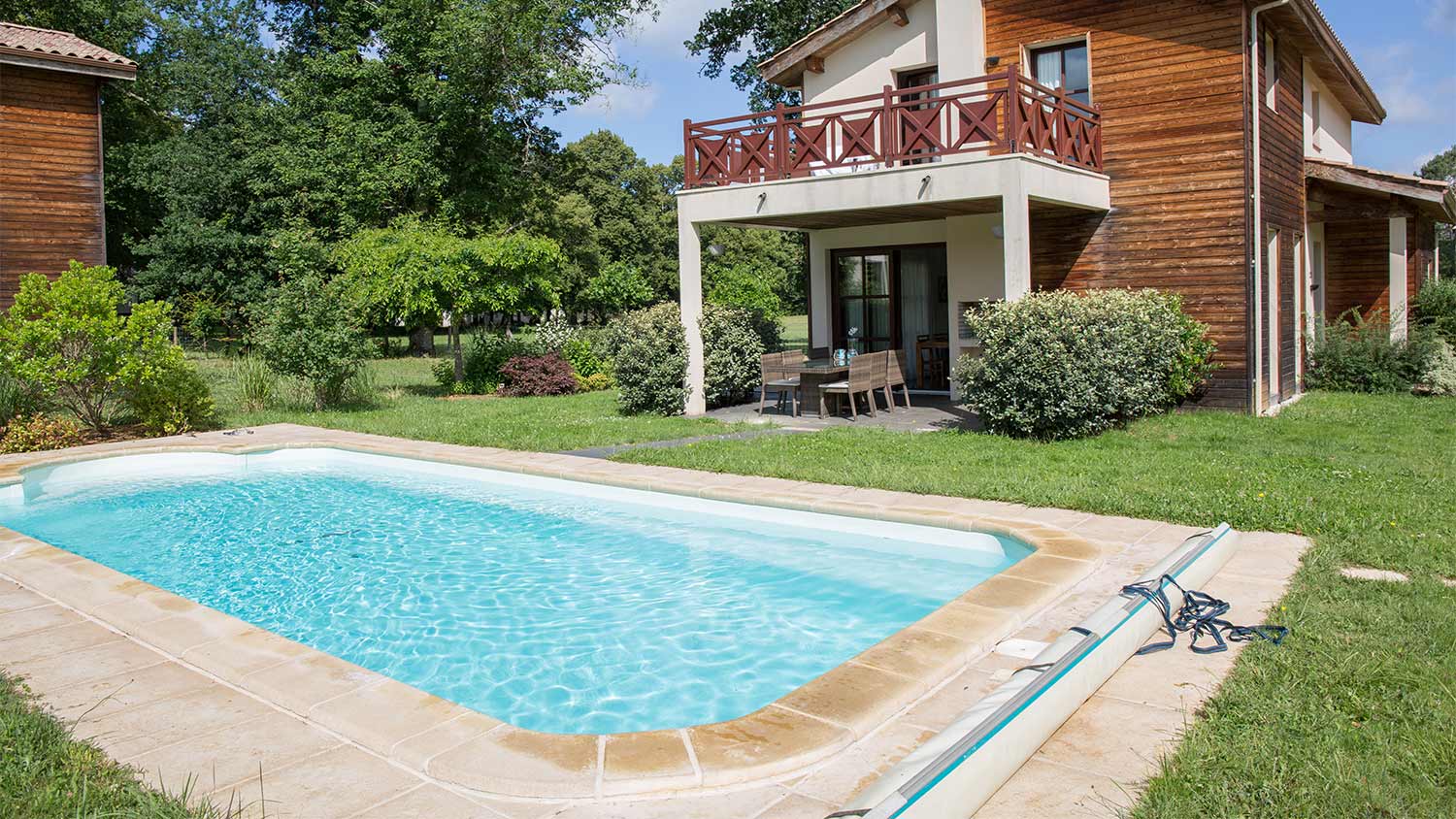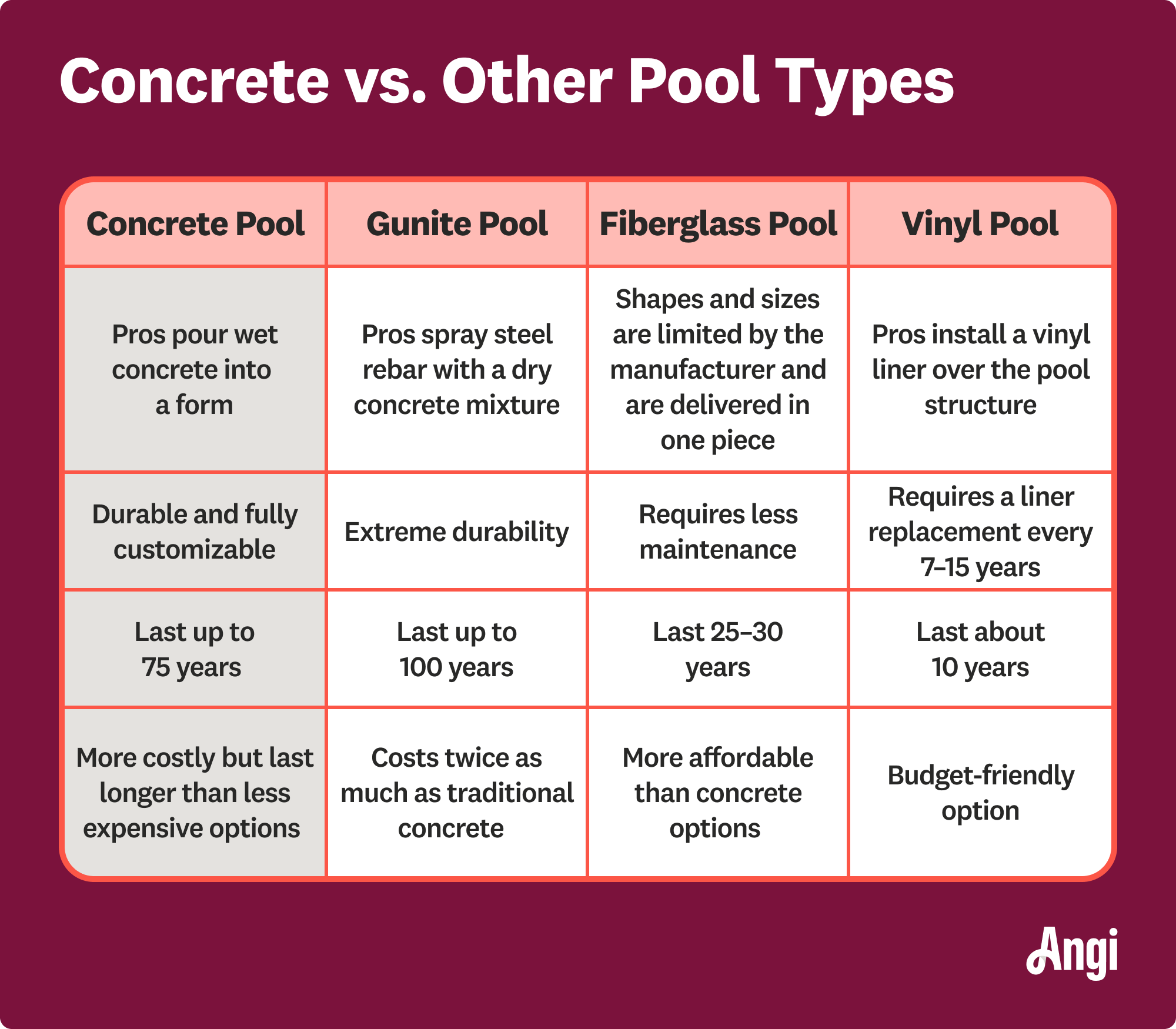
Semi-inground pools offer a nice balance of convenience and affordability. Use this guide to estimate semi-inground pool costs to transform your backyard.
This durable pool material is sometimes worth the splurge


Concrete pools are one of the most durable types of pools.
An in-ground concrete pool costs an average of $55,000.
If well-maintained, your concrete pool can last up to 75 years.
Concrete requires increased maintenance because it’s porous.
The installation process is long because concrete must cure.
Sometimes you get what you pay for—and that’s a good thing when it comes to pools. Concrete pools aren’t wallet-friendly, but they’ll make a splash in your backyard with endless customization options and high durability. Still, there are some important considerations before diving into an installation. Here’s everything you need to know.
Before buying your new pool, consider the pros and cons of concrete swimming pools. You can construct a concrete pool with two types of concrete. Shotcrete is a wet mixture, and gunite is a dry mixture (you’ll often hear the latter type of pool referred to as a gunite pool rather than a concrete pool). These mixtures consist of the same three components:
Water
Some sort of aggregate, like rock, gravel, or sand
Cement
Your pro will spray the concrete onto steel rebar (as is common with gunite) or pour it into concrete forms (as is common with shotcrete). The cement acts as a binder, and as the mixture cures, it hardens into an extremely durable, rock-like building material. The more cement you use, the stronger the concrete.

Concrete in-ground pools cost $66,000 on average, with most homeowners spending between $45,000 and $88,000. Concrete is a higher-end pool material, and the price reflects it. That said, concrete pools can last upward of 75 years, which can negate the savings you’d get from materials like fiberglass or vinyl.
Concrete aboveground pools are a whole different ball game. You’ll see this custom job for luxury plunge pools, hot tubs, and spa projects. While the average aboveground pool costs $3,500, a concrete aboveground pool costs about the same per square foot as a concrete in-ground pool.
In addition to up-front installation costs, you should also budget for long-term pool maintenance costs. This includes everything from the cost of filling your pool to pool cleaning, electricity use, and pool liner replacements. The average pool professional charges $50 to $100 per hour for labor.
Pool maintenance tasks include:
Cleaning your pool at least once a week
Winterizing your pool for the winter season
Acid washing your pool shell every 3–5 years
Draining and refilling your pool every 5–7 years
Replacing your pool liner every 5–7 years
Retiling or replastering your pool every 10–15 years
The main benefits of concrete pools are durability and versatility. Unlike other materials, concrete is fully customizable. You can shape it however you want (as opposed to fiberglass pools made with prefabricated shells). It also has the longest lifespan out of any type of pool and isn’t easily damaged by harsh weather or sharp objects. In other words, you’ll never have to worry about an errant pool skimmer or even some accidental rocks.
Concrete may be a long-lasting pool material—but it does require patience. It can take months to install a pool made from concrete, mainly because the concrete must cure for at least 30 days in the middle of the process. In contrast, you can install an aluminum aboveground pool in a single weekend.
Concrete pools also require more maintenance than other types. Since the surface is porous, they’re prone to algae buildup. You’ll need to master the art of pool cleaning chemicals, and if you don’t winterize your pool properly, ice can cause the concrete to crack.
| Pros | Cons |
|---|---|
| Fully customizable | High installation costs |
| Extremely durable | Long installation process |
| Up to 75-year lifespan | High maintenance costs |
| Tolerates cold and heat | Requires resurfacing every few years |

Concrete isn’t the only option for an in-ground pool, and you can even occasionally mix materials (think: adding a vinyl liner or porcelain tile). Though you should run down your options with an in-ground pool company near you, here’s how concrete holds up compared to other common materials.

Gunite is a type of concrete. Pros craft these pools by spraying steel rebar with a dry concrete mixture rather than pouring wet concrete into a form like you would with a traditional concrete pool. The result is extreme durability. The average cost of a gunite pool is about twice as much as a traditional concrete pool, but it can last up to 100 years.
When it comes to concrete versus fiberglass pools, fiberglass wins on both price and maintenance. The average fiberglass pool costs around $30,000 and is relatively easy to maintain. It’s naturally algae-resistant, and you won’t have to resurface it as frequently as concrete. Beyond that, it’s quicker to install and typically easier to repair, but the lifespan is only around 25 to 30 years.
With an average installation cost of $30,000, vinyl pools are one of the most budget-friendly in-ground pool options. During construction, your contractor will install a vinyl liner over the pool structure—which allows for the versatility of concrete but with half the cost and considerably less maintenance.
Some homeowners use a combination of vinyl and concrete. You can pop a vinyl liner on top of your concrete pool to create a smoother, softer surface for swimmers. That said, vinyl liners only last about 10 years, and a replacement pool liner costs around $1,100 to $3,600.
From average costs to expert advice, get all the answers you need to get your job done.

Semi-inground pools offer a nice balance of convenience and affordability. Use this guide to estimate semi-inground pool costs to transform your backyard.

From small leaks to broken pool pumps, how much do pool repairs cost? We'll break down what to expect from your pool repair bill no matter the size of the fix.

Is it time to treat yourself to backyard pool parties and late-night swims? Start with our guide, which answers the question: how much does it cost to build a pool?

Hiring the right pro to build your pool is critical for a successful project. Find out what questions to ask pool builders to find the right match.

The type of pool finish you choose is the best way to both show off your personal style and protect your pool in the long run. Let's walk through your options for pool finishes.

Dreaming of getting in those daily laps without tearing up your backyard? Here’s what to know about endless pool costs so you can plan your project.